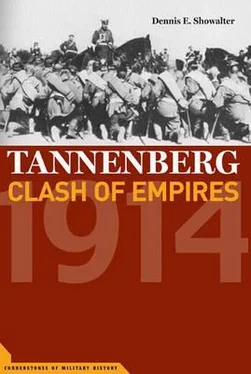59“Der Aufmarsch gegen Russland,” Jan., 1894, Mohs, Waldersee II, 343 ff.
60Lothar Höbelt, “Schlieffen, Beck, Potiorek und das Ende der gemeinsa-men deutsch-österreichischen-ungarischen Aufmarschpläne im Osten,” Militärgeschichtliche Mitteilungen XXXVI (1984), 7–30, demonstrates that this anxiety was shared by the Austrians, and was a major factor in their ready acceptance of the revised German strategy.
61Gerhard Ritter, The Schlieffen Plan: Critique of a Myth, tr. E. Wilson (London, 1958); and Jehuda Wallach, The Dogma of the Battle of Annihilation (Westport Conn.: 1986). Both minimize Schlieffen’s concern for the east as a factor in his planning. Cf. L. C. F. Turner, “The Significance of the Schlieffen Plan,” Australian Journal of Politics and History XIII (1967), 49–66.
62Allan Mitchell, Victors and Vanquished: The German Influence on Army and Church in France after 1870 (Chapel Hill, N.C., 1984), presents this process in detail.
63The Anglo-French entente of 1904 also generated the “hostage theory,” by which in case of war with England, decisive pressure was to be exerted on an otherwise inaccessible enemy by overrunning France, and arguably the Low Countries as well. Cf. Einem to Bülow, Oct. 17, 1904, with Schlieffen’s enclosure of Oct. 7, in PAAA, Deutschland 138, Geheim/6; and Bülow to Holstein, Dec. 15, 1904, in Holstein Papers IV, Nr. 869.
64Schlieffen to his sister Marie, November 13, 1892, in Eberhard Kessel, ed., Generalfeldmarschall Graf Alfred Schlieffen. Briefe (Göttingen, 1958), 295–298.
65The evolution of Schlieffen’s thought can be traced in the Aufgaben for 1903 and 1904 in Generalstab des Heeres, Kriegswissenschaftliche Abteilung (ed.), Dienstschriften des Chefs des Generalstabes der Armee Generalfeldmarschalls Graf von Schlieffen, Vol. I, Die taktisch-strategischen Aufgaben aus den jahren 1891–1905 (Berlin, 1937), 103 passim; and the “Staff Rides East” for 1901 and 1903, in ibid., Vol. II, Die Grossen Generalstabsreisen-Ost aus den jahren 1891–1905 (Berlin, 1937), 222 ff. and 300 ff.
66“Operationsstudie gegen Russland,” Mar. 1898, Mohs, Waldersee II, 348 ff.
67Cf. in particular Aufgaben of 1891, 1898, 1899 and 1904; and the Staff Rides East for 1897, 1899, 1901, and 1903, in Dienstschriften I and II. The anecdote is from Hermann von François, Marneschlacht und Tannenberg (Berlin, 1920), 126.
68Schlieffen’s growing pessimism is described in Gerhard Ritter, Sword and Scepter, tr. Heinz Norden, 4 vols. (Coral Gables, Fla., 1969–73), II, 199 ff. Hans Delbrück’s 1896 critique of Bloch, “Zukunftskriege und Zukunftsfriede,” is reprinted in Erinnerungen, Aufsätze und Reden (Berlin, 1902), 498–525. Cf. for purposes of comparison T. E. H. Travers, “Technology, Tactics, and Morale: Jean de Bloch, the Boer War, and British Military Theory 1900–1914,” Journal of Modern History LI (1979) 264–286.
69John Lewis Gaddis, Strategies of Containment: A Critical Appraisal of Postwar American National Security Policy (New York, 1982), 273.
70Holstein to Brauer, Dec. 23, 1905, Holstein Papers IV, 376 ff.
71For the entente see particularly J. J. Williams, “The Strategic Background to the Anglo-Russian Entente of August, 1907,” Historical Journal IX (1966), 360–373; and G. Monge, Ursachen und Entstehung der englisch-französischen-russischen Entente 1900–1907 (Seeheim, 1969). Barbara Jelavich, “British Means of Offense against Russia in the Nineteenth Century,” Russian History I (1974), 119–135, legitimates Russia’s strategic concerns. Keith Neilson, “Wishful Thinking: The Foreign Office and Russia, 1907–1917,” in Shadow and Substance in British Foreign Policy 1895–1939. Memorial Essays Honouring C. V. Lowe (Edmonton, Alberta, 1984), 151–180, stresses Britain’s need for an arrangement with Russia.
72Nicolson to Grey, Jan. 2, 1907 and Jan. 29, 1908, British Documents on Foreign Affairs: Reports and Papers from the Foreign Office Confidential Print, Series A, Russia, 1859–1914, ed. D. Lieven, 6 vols. (Washington, D.C., 1983), IV, Nr. 187; V, Nr. 20.
73Immanuel Geiss, German Foreign Policy, 1871–1914 (London, Boston, 1976), 107; Fritz Fischer, War of Illusions, tr. M. Jackson (New York, 1975), 51.
2. THE CENTER FAILS TO HOLD
1Wilhelm M. Carlgren, Iswolsky und Aehrenthal vor der bosnischen Annexion-skrise: Russische und österreichisch-ungarische Balkanpolitik 1906–1908 (Uppsala, 1955), presents the background of the annexation. Bernadotte Schmitt, The Annexation of Bosnia, 1908–1909 (Cambridge, 1937), and M. Nintchitch, La Crise bosniaque et les puissances européenes, 2 vols. (Paris, 1937), cover the annexation itself. For the developing role and belligerent nature of public opinion in Russia cf. Manfred Hagen, Die Entfaltung politischer Öffentlichkeit in Russland 1906–1914 (Wiesbaden, 1982); and Caspar Ferenczi, Aussenpolitik und Öffentlichkeit in Russland, 1906–1912 (Husum, 1982). For the Central Powers cf. H. A. Gemeinhardt, Deutsche und österreichische Pressepolitik während der Bosnischen Krise 1908/09 (Husum, 1980).
2For tension between Austria and Germany at this period see Michael Belinen, Rüstung-Bündnis-Sicherheit. Dreibund und informeller Imperialisms 1900–1908 (Tübingen, 1985).
3Roger Chickering, Imperial Germany and a World without War (Princeton, 1975); Wolfgang J. Mommsen, “The Topos of Inevitable War in Germany in the Decade before 1914,” in Germany in the Age of Total War, ed. V. R. Berghahn and M. Kitchen (London, 1981), 23–45.
4Holstein to Bülow, Oct. 13, 1908, in The Holstein Papers, 4 vols., ed. Norman Rich (Cambridge, 1959–63), IV, Nr. 1142; Bülow to Holstein, Dec. 27, 1908, ibid., Nr. 1173; Szögeny to foreign office, Dec. 16, 1908, in Ludwig Bittner, et al., Oesterreich-Ungarns Aussenpolitik von der bosnischen Krise 1908 bis zum Kriegsausbruch 1914 , 8 vols. (Vienna, 1930), I, Nr. 752. Hintze to William, Oct. 23, 1908; Monts to Bülow, Oct. 25, 1908; Pourtalés to Bülow, Oct. 30, 1908, in Politisches Archiv des Auswärtigen Amtes, Deutschland 121/30 (hereafter cited as PAAA).
5Bülow’s memorandum of Oct. 27, 1908, ibid.; Bülow to Aehrenthal, Jan. 8, 1909, in J. Lepsius, A. Mendelsohn-Bartholdy, F. Thimme, eds., Die Grosse Politik der europäischen Kabinette 1871–1914, 40 vols. (Berlin, 1922–27), XXV, Nr. 9173 (hereafter cited as GP).
6Aehrenthal to Bülow, Feb. 20, 1909; and Kaegenich’s report of Feb. 23, 1909, in GP XXVI, 2, Nrs. 9386, 9390; Cartwright to Grey, Mar. 6, 1909, in British Documents on the Origins of the War, 1878–1914, ed. G. P. Gooch and H. W. V. Temperley, 11 vols. (London, 1926–1938), V, Nr. 657 (hereafter cited as BD).
7Miquel to Bülow, Nov. 27, 1908; Pourtalés to Bülow, Dec. 11, 1908 and Jan. 30, 1909; Moscow Consulate to Bülow, Dec. 4, 1908; PAAA, Deutschland 131/30.
8Nicolson to Grey, Feb. 8, 1909, British Documents on Foreign Affairs: Reports and Papers from the Foreign Office Confidential Print, Series A, Russia, 1859–1914, ed. D. Lieven, 6 vols. (Washington, D.C., 1983), V, Nr. 61 (hereafter cited as BDFA).
9Hintze to William, Feb. 24, 1909, PAAA, Russland 98, Geheim.
10Bülow to Pourtalés, Mar. 14 and 29, 1909, GP XXVI, 2, Nrs. 9437, 9460; Hintze to Bülow, Mar. 20, 1909, PAAA, Deutschland 131/30; Pourtalés to foreign office, Mar. 22, 1909; GP, XXVI, 2, Nr. 9464.
Читать дальше












